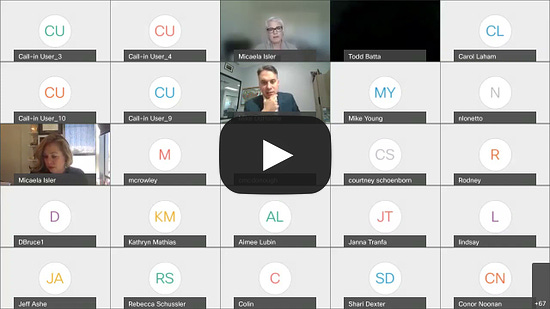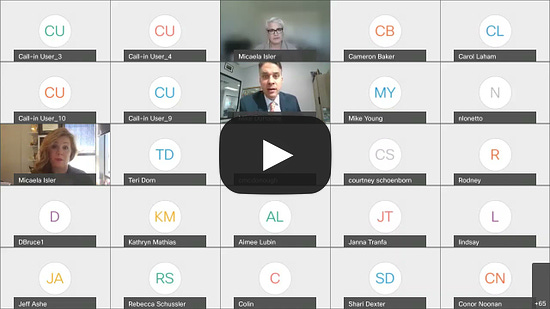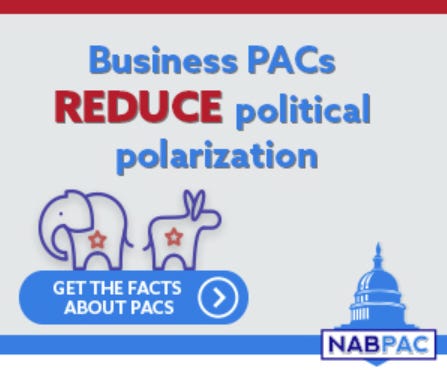EXCLUSIVE: How corporate PACs are plotting to "move beyond" January 6
Today's newsletter is based on video, emails, and other documents obtained exclusively by Popular Information. It provides an unprecedented look at how people involved with corporate PACs operate behind closed doors. This edition is part of an ongoing effort to hold companies accountable for their political activity — including companies that donate to Republicans who voted to overturn the election. You can support this work with a paid subscription. But you can't take on some of the biggest corporations in America without being completely independent. That's why Popular Information accepts no advertising. This newsletter only exists because of the support of readers like you. Following the attack on the United States Capitol on January 6, dozens of corporations announced they were suspending PAC donations to the 147 Republicans who voted to overturn the election. Many more announced they were suspending all PAC activity. For the National Association of Business PACs (NABPAC), the trade association for corporate PACs, this is a problem. Emails, video, and other internal documents obtained by Popular Information reveal how NABPAC has been encouraging its membership, which includes more than 250 corporate PACs, to "move beyond" January 6 and resume their political contributions. On March 2, NABPAC hosted a webinar called "Where Do We Go From Here." The event featured Michael DuHaime, a prominent Republican operative and crisis communications consultant. During the event, DuHaime and others provided strategic and messaging advice about how to restart political donations — including donations to the 147 Republicans who voted not to certify the Electoral College results based on Trump's lies. The event was attended by about 80 representatives of corporate PACs, including major companies like Delta, Dow, Altria, Northrup Grumman, New York Life, Lincoln Financial, and Boston Scientific. NABPAC board members include representatives from Microsoft, Kraft Heinz, Eli Lilly, Home Depot, and Cigna. A recording of the webinar was accessible to the public through Vimeo, a video-sharing website. Shortly after Popular Information contacted NABPAC for comment, the video was password protected. In the webinar, DuHaime encouraged companies not to be pressured to withhold donations from Republicans who voted to overturn the election. Instead, DuHaime said corporations should "do what's right for your organization" and "deal with the fallout." He predicted that resuming contributions to Republican objectors "most likely… would be a one day story and most likely you are not going to lose customer share over it."  DuHaime cautioned that January 6 is "very emotional in a way that other things in politics haven't been." At another point in the webinar, he encouraged corporations to prepare a communications strategy justifying their decision to give money to Republicans who voted to overturn the election. DuHaime provided a hypothetical series of tough questions: "Why did you give to this person? This person voted after a Capitol insurrection where a police officer was killed, and you decided to max out to that person? Why did you do that?" He said that is a "really tough question" but "there is probably a good answer." One suggested response DuHaime offered is that the Republican objector "supported ten other things that are important to your industry."  At times, DuHaime was clear-eyed about the significance of the events of January 6. He said the story is "bigger" and "different" than other controversies. DuHaime, a frequent commentator in the media who has been critical of Trump's claims of election fraud, said that he personally had "strong emotions" about the attack. DuHaime also encouraged corporations to be "consistent with the commitments you've made." DuHaime said, for example, that if a corporation publicly said it would stop donating to Republican objectors for two years, it should fulfill that pledge. But DuHaime also discouraged corporations from making such commitments. He said that "people move on" and "things will feel differently 16 months from now." He advised corporate PACs to not "externally set a timeline" because it gives "reporters a time to check back in with you." Instead, "if you are going to pause… don't tell anyone when the pause is over." Ultimately, DuHaime emphasized the need for corporations to change their messaging rather than their behavior. Corporations cannot, according to DuHaime, tell a reporter that it made a donation because "this person has power over us and we need access to that person" even if that is "exactly what you are doing." DuHaime said contributing to a member of Congress because they have power over legislation impacting your company is a "good reason to give." But he recommends establishing a more palatable public pretext for the donation. DuHaime advises corporations should "figure out ways to justify that [donation] externally that go just beyond the fact that this is someone who is in power today."  Aime Adams, a PAC consultant who served as moderator of the event for NABPAC, said corporations need to establish that voting to overturn the election is not disqualifying because it could be applied to other issues. "The next thing is climate change," Adams said, "Your company says they are big on the environment and you are giving money to climate deniers." Last summer, Adams noted, there was controversy over companies that said they "stand for racial justice" but gave to "people who are coming out against the protestors." Corporations, Adams said, need to establish that donations are not about "one day" or "one vote" but the "totality of the relationship." In response to a request for comment, NABPAC declined to address the substance of the webinar but said that "Mike [DuHaime] and NABPAC are on the record denouncing the [January 6] Capitol attacks multiple times." DuHaime did not respond to a request for comment. Corporate PACs that resumed donations to Republican objectors presented as modelsAccording to an email obtained by Popular Information, NABPAC hosted another webinar on April 13 called "News from the Frontline." The purpose of the webinar was to hear from a "panel of PAC directors whose PACs have already started making contributions." The panel included Kim Snow, the PAC director for Cigna. On January 13, Cigna, one of the nation's largest health insurers, issued the following statement:
In the first three months of 2021, Cigna donated to six members of Congress that hindered a peaceful transition of power by objecting to the certification of the Electoral College — Congressmen Byron Donalds (R-FL), Tom Rice (R-SC), Bill Johnson (R-OH), Guy Reschenthaler (R-PA), Jodey Arrington (R-TX), and Billy Long (R-MO). Cigna told the New York Times that these donations didn't violate its pledge to elected officials who "hindered a peaceful transition of power" because congressional votes are “by definition, part of the peaceful transition of power.” The company's official position is that voting to overturn the election is part of the "peaceful transition of power." The company is now being held out as a model by NABPAC. Another participant in the panel was Lisa Strikowsky Gillman, the Senior Government Affairs Manager for T-Mobile. After January 6, T-Mobile said it was "suspending all of our PAC distributions" in light of the "unacceptable" attack on the democratic process. But in February, TMobile donated $15,000 each to the National Republican Congressional Committee (NRCC) and the National Republican Senatorial Committee (NRSC). The two entities will support the campaigns of every Republican objector running for reelection. The NRSC is chaired by Senator Rick Scott (R-FL), who voted to overturn the election. On April 6, according to an email obtained by Popular Information, NABPAC hosted "a special briefing" for members with Matt Moon, Deputy Executive Director of the NRSC. NABPAC's internal survey of corporate PACsIn March, according to documents obtained by Popular Information, NABPAC conducted a survey of its membership called "Moving Beyond the Pause." In a March 30 email detailing the results, NABPAC said that, among the respondents, 67% told NABPAC "their PAC established a pause in making some or all contributions." Among those who paused, "nearly half (47%)" said "they would be doing so for the first quarter of 2021." The survey suggests there may be a significant uptick in corporate PAC donations in the second quarter of 2021. Who receives this money is an open question. NABPAC did not indicate how many corporate PACs specifically intended to give to Republican objectors after the first quarter. In the first quarter, corporate PAC donations plunged for Republicans who voted to overturn the election, and two-thirds of that group had "overall fundraising declines." NABPAC is also running a series of print and digital ads "to defend the business PAC community as candidate/committee contributions begin again." Among the core talking points is that contributions from PACs "reduce political polarization." That claim is based on a 2016 study of state legislators. It found that "[i]ndividual donors prefer to support ideologically extreme candidates while access-seeking PACs tend to support more moderate candidates." Therefore, "higher limits on contributions from political action committees (PACs) lead to the selection of more moderate legislators." Ironically, NABPAC is now trying to use this study to help justify the resumption of donations to the Republicans who voted to overturn the election — an extraordinarily partisan group of elected officials. Bloomberg reported that Popular Information’s original journalism is creating a “political reckoning” in corporate America. You can support this work with a paid subscription. |
Older messages
Facebook's problem isn't Trump — it's the algorithm
Thursday, May 6, 2021
Facebook is in the business of making money. And it's very good at it. In the first three months of 2021, Facebook raked in over $11 billion in profits, almost entirely from displaying targeted
UPDATE: Some corporations break their silence on Texas' voter suppression bills
Wednesday, May 5, 2021
For months, members of the Texas legislature have been considering two bills (SB7 and HB6) that would make it harder to vote — particularly in areas with large Black populations like Harris County. In
The counting will continue until results improve
Tuesday, May 4, 2021
A count of the votes of November's presidential election in Arizona found that Joe Biden defeated Donald Trump by 10458 votes. Republicans immediately zeroed in on Maricopa County, home of Phoenix,
Is your T-shirt a human rights violation?
Monday, May 3, 2021
The next T-shirt you buy could be made from cotton harvested by forced manual labor in the Chinese territory of Xinjiang. The Chinese government has fiercely retaliated against clothing brands and
The radicalization of the Texas GOP
Thursday, April 29, 2021
The locus of political and economic power is shifting in the United States. And it's shifting toward Texas. According to the 2020 Census, Texas gained 4 million residents over the last 10 years and
You Might Also Like
UW and computer science student reach truce in ‘HuskySwap’ spat
Saturday, January 11, 2025
Blue Origin set for first orbital launch | Zillow layoffs | Pandion shutdown | AI in 2025 ADVERTISEMENT GeekWire SPONSOR MESSAGE: GeekWire's special series marks Microsoft's 50th anniversary by
Cryptos Surrender Recent Gains | DOJ's $6.5 Billion Bitcoin Sale
Saturday, January 11, 2025
Bitcoin and other tokens retreated as Fed signaled caution on rate cuts. Forbes START INVESTING • Newsletters • MyForbes Presented by Nina Bambysheva Staff Writer, Forbes Money & Markets Follow me
Just Buy a Balaclava
Saturday, January 11, 2025
Plus: What Raphael Saadiq can't live without. The Strategist Every product is independently selected by editors. If you buy something through our links, New York may earn an affiliate commission.
Up in Flames
Saturday, January 11, 2025
January 11, 2025 The Weekend Reader Required Reading for Political Compulsives 1. Trump Won't Get the Inauguration Day He Wanted The president-elect is annoyed that flags will be half-staff for
YOU LOVE TO SEE IT: Biden’s Grand Finale
Saturday, January 11, 2025
Biden drills down on offshore drilling, credit scores get healthier, social security gets a hand, and sketchy mortgage lenders are locked out. YOU LOVE TO SEE IT: Biden's Grand Finale By Sam Pollak
11 unexpected things you can put in the dishwasher
Saturday, January 11, 2025
(And 7 things you should keep far away from there) View in browser Ad The Recommendation January 11, 2025 Ad 11 things that are surprisingly dishwasher-safe An open dishwasher with a variety of dishes
Weekend Briefing No. 570
Saturday, January 11, 2025
Black Swan Threats in 2025 -- Why Boys Don't Go To College -- US Government's Nuclear Power Play ͏ ͏ ͏ ͏ ͏ ͏ ͏ ͏ ͏ ͏ ͏ ͏ ͏ ͏ ͏ ͏ ͏ ͏ ͏ ͏ ͏ ͏ ͏ ͏ ͏ ͏ ͏ ͏ ͏ ͏ ͏ ͏ ͏ ͏ ͏ ͏ ͏ ͏ ͏ ͏ ͏ ͏ ͏ ͏ ͏ ͏ ͏ ͏
Your new crossword for Saturday Jan 11 ✏️
Saturday, January 11, 2025
View this email in your browser Take a mental break with this week's crosswords: We have six new puzzles teed up for you this week. Play the latest Vox crossword right here, and find all of our new
Firefighters Make Progress, Water Rankings, and Ohio St. Wins
Saturday, January 11, 2025
Multiple wildfires continued to burn in Southern California yesterday, with officials reporting at least 10 deaths. Over 10000 homes across 27000 acres have burned, and 20 suspected looters have been
☕ So many jobs
Saturday, January 11, 2025
So why did stocks fall? January 11, 2025 View Online | Sign Up | Shop Morning Brew Presented By Indacloud Good morning. It's National Milk Day, the one day of the year you're allowed to skim


